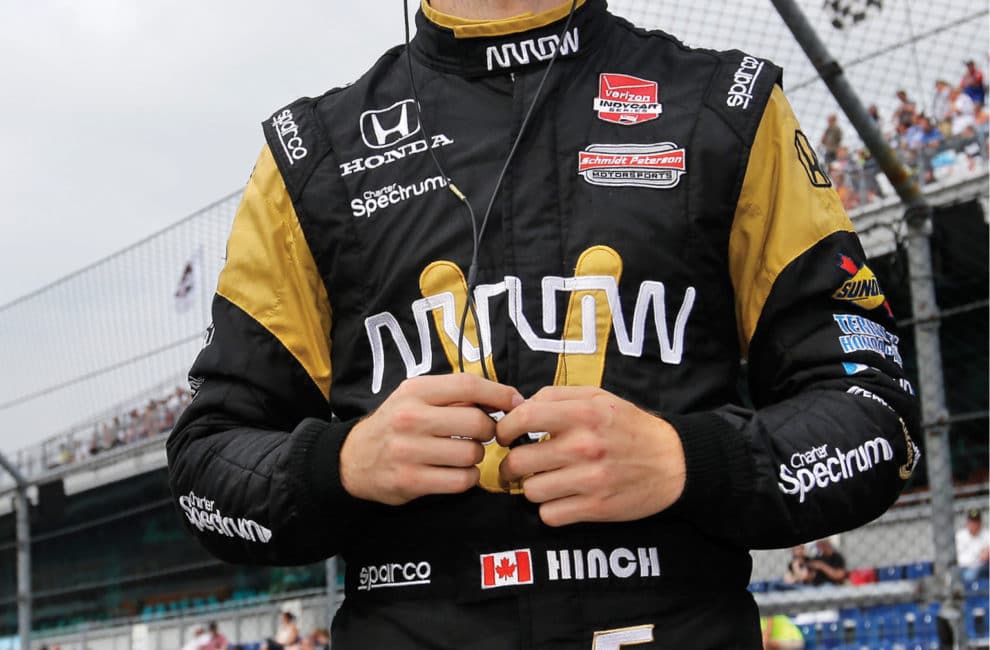
AMA: James Hinchcliffe
This month’s Firestone Grand Prix of St. Petersburg marks the opening of the IndyCar season, and with it, the return of James Hinchcliffe. The 2011 Rookie of the Year hasn’t raced since last May, when a wreck during practice for the 500 left him with a steel wishbone driven through his pelvis. Hinch, the face of a local beer (Flat 12 Bierwerks’s Hinchtown Hammerdown), talks about the crash, the inherent dangers of racing, and the camaraderie the risk builds between drivers.
First race since the accident—ready?
Every driver is excited to get back behind the wheel, but I don’t think there’s any doubt that my desire to get back to St. Pete and back to racing is going to be higher than everyone else’s.
Are you a little nervous or anxious?
It’s not something that I’m worried about. I’m excited. I think, fundamentally, drivers are wired wrong. At some point every driver will experience something that would give a normal person pause. We’re wired in a way that, even if something happens in the car that takes us out, the first thing we’re thinking about is how and when we’re going to get back in.
You’ve said before that you don’t remember the actual wreck. Do you think you repressed it because of that unique wiring? Or was that the accident itself?
No—I think it was the concussions. [Uneasy laughter.] I remember starting that lap and being behind Montoya. Had a nice tow. The car was actually feeling pretty good. Then just after the start/finish line, I kind of lose my picture. The next thing I remember is waking up in the ICU and asking a bunch of questions.
You were also impaled, a unique injury for drivers.
Normally the kinds of injuries drivers suffer are bone fractures—wrists, back, legs, ankles—and the recovery for those is pretty specific. I had some serious wounds. Surgical openings had to heal. There was a lot of muscle and soft-tissue damage. There was more muscle loss—I wasn’t allowed to walk for a couple months—so there were parts of my body that weren’t injured that took a big hit.
The 2015 season was wiped out. But in August you drove across the Golden Gate Bridge in honor of Justin Wilson, who had perished in a wreck at Pocono.
I was thrilled to have been invited to participate, but it was obviously tough—it was the first time a lot of us were seeing each other since Pocono. For me, it was the first time putting my racing suit back on—I wasn’t medically cleared to get back into the car, but it was a two-seater, just a demonstration. We weren’t going to do anything crazy. And besides, there was no way I wasn’t going to do it.
Justin’s accident didn’t affect my getting back in the car. But it definitely made me appreciate the severity of my accident and how lucky I was. I spent a lot of time at the hospital [visiting Justin] in Pennsylvania going through what a lot of the people who came to the hospital to see me in those first hours and days went through. Experiencing it from that side made my accident more real to me.
Seems as if a tragedy like that would strengthen the bond on the paddock, but it’s already pretty tight. In fact, didn’t you become an ordained minister at the request of one of your fellow drivers?
Charlie Kimball asked me to preside over his wedding [in 2014]. Who’s going to deny the bride and groom their wedding-day wish? It was easily the scariest thing I’ve ever done in my life. I mean, it’s their wedding day—you don’t want to screw that up. If I crash my car during a race, obviously that’s a bad result, but I get to go again and try next week. If you screw up someone’s wedding, there are not a whole lot of do-overs in that case.
Are you concerned at all about overall safety in the sport?
I don’t think there is a sport out there that has put as much time and effort into protecting its athletes as IndyCar has. Talk about concussions—it’s well known that the NFL’s helmet technology is appallingly archaic. They’ve resisted change, and it’s shocking. IndyCar would never put anything in front of driver safety. We’ll never make it 100 percent safe, and that’s something we all understand and acknowledge.
What’s it going to be like coming back to Indy, the scene of the wreck?
It would be meaningful for me if it was the 14th or 95th running, but the fact that it’s the 100th is going to be so special. As a driver, you’ve got to think about it as any other race. But as a fan, I can’t wait to see all the events and the pageantry.





